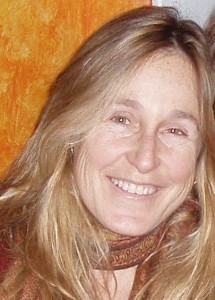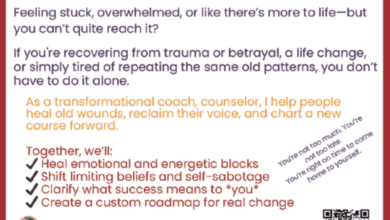Sexuality and Intimacy – a Rogue Valley Psychologist’s specialty
Sexuality has a strange position in our culture. It remains somewhat taboo – we don’t really talk about it, yet we assume that couples are engaging in reasonably satisfying sexual lives. This may not be true. Since we don’t discuss it, we don’t really know.
Dr. Shavana Fineberg, 38-year Psychologist, recently closed her general practice to focus on her specialty, Intimacy and Sexuality. She maintains that Sexuality is a legitimate and important part of people’s lives, worthy of attention if it is not bringing them joy, pleasure and deep intimacy. She addresses not only sexual “problems,” but also developing sexual potential.
Dr. Fineberg, I applaud your courage to focus your practice on Sexuality – your trust that people are ready to talk about this aspect of their lives and admit need for improvement. What led to that decision?
Shavana: Over time I kept noticing that I was most excited about my sessions dealing with sexuality. My training has been a bit unusual. I studied for 14 years in one of the major U.S. Tantra schools, focusing on four aspects of sexuality – intimacy, pleasure, emotional healing, and spirituality. I found that tantric tools ideally complemented the techniques offered by traditional Sex Therapy, and seemed to have something different and valuable to offer. Last year I took a six month Sabbatical and immersed myself in bringing myself fully current with the field of Sex Therapy. I emerged with the clarity to devote myself to a Sexuality specialty and now, 9 months later, I’m thrilled with my decision. My practice is growing rapidly and my excitement about my work is totally renewed.
You’ve said you believe that society does us a disservice around sexuality. Can you explain?
Shavana – Our culture implies, through movies and novels, that lovemaking is supposed to be the pinnacle of ecstasy and bonding, yet never are we given training as to how to reach those heights. Instead, we’re shamed about exploring our own bodies to discover what pleasures us, and about asking our partners questions because we’re supposed to already know everything. We’re embarrassed when our bodies don’t fit youthful stereotypes, and to admit to our natural sexual desires. How are we supposed to create deeply intimate mutually pleasurable experiences and reach our sexual potential under such conditions?
How do you make people comfortable to learn about sexuality?
Shavana: I first explain that sex is not actually always intense, serious and glorious. It can also be playful, messy, laughable, clumsy, a flop, etc. All of these are part of the intimate journey.
I then ask my clients to begin from three principles.
Innocence is starting from the stance that they don’t know anything about sex – about pleasuring their own or their partner’s body. They can drop what they think they know or think they’re supposed to know. What a relief!
The second principle is Trust. In order to best enjoy a sexual experience one needs to feel safe in the presence of their partner. Safe to expose one’s emotions, one’s body, one’s sexual pleasure. Safe to surrender to an energy bigger than oneself and not know what will happen. Some of the exercises I assign develop this trust. If trust is an issue initially, we may do some couple work before we begin the sexual discovery process.
The third principle is Discovery. I cannot tell anyone exactly what will most please their or their partner’s body – but I can offer certain attitudes, principles and explorations by which they will discover together what works for them.
Who comes to you for assistance, and with what issues?
Shavana: People of all ages come with many different issues. I see men grappling with ejaculating more rapidly than they wish, and couples in their 20’s starting out on their sexual lives together wanting guidance. I see older couples with empty nests whose work-lives are over and who suddenly have time available together. Perhaps the woman is experiencing post-menopausal reduced desire and/or diminished lubrication and the man has had some erectile difficulties. This may have been so upsetting that they backed away from physical intimacy, even physical affection. They seek to find their way back to the joy of embodied intimacy, whatever form that takes. I love working with these couples.
What can someone expect if they come to you?
Shavana: First, acknowledgement that it can feel awkward to talk to a stranger about this intimate part of their lives. Usually my ease with the subject is contagious and we end the first session with both partners feeling very comfortable.
After the introductory session, I will schedule a history-taking session – for a couple, often individually with each partner. Then I discuss how I would approach the individual’s or couple’s concerns. My approach is short-term, so I describe how many sessions I expect to need.
Medical costs are incredibly high – is your help affordable?
Shavana: Assuming the sexual issue is truly creating distress, my work is usually covered by Insurance and the clients are only liable for their co-pays.
What is this “RESET Program” that you offer?
Shavana: I finally combined the tantric “homeplay” exercises that I was consistently assigning couples into a short-term program called “RESET: Rediscovering Sexuality Together.” I offer RESET in a private couple and a small group format and can travel with the group format.
How do people contact you?
Shavana: I work both out of Grants Pass and Ashland and can be reached at (541) 846-0590.
Any last thoughts or comments for the readers?
Shavana: I believe sexuality is an important part of wellbeing, contributing to joy, pleasure, healing, emotional intimacy, and contentment. It is time for this area of life to be brought out of the closet, and for us to be able to talk about it and learn how to grow towards enjoying true intimacy and our sexual potential.





